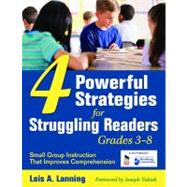
Note: Supplemental materials are not guaranteed with Rental or Used book purchases.
Purchase Benefits
What is included with this book?
| Foreword | |
| Preface | |
| Acknowledgments | |
| About the Author | |
| Foundations Recent Findings From Comprehension Strategies | |
| Why Four Powerful Strategies? | |
| The Four Powerful Comprehension Strategies Summary of Recent Findings | |
| From Comprehension Research Reading Comprehension | |
| Instruction Comprehension Instructional | |
| Activities and Practices Research on the Transfer of Learning | |
| What Is Transfer? | |
| A Closer Look at Transfer Theory Summmary of Reading Comprehension Instruction | |
| Gradual Release to Accelerate Progress Gradual Release Lesson Design | |
| Conclusions and Reflections | |
| Putting the Strategies Into Practice | |
| Summarizing What Is Summarizing? When Does a Reader Summarize? | |
| Why Do Readers Summarize? Sample Lessons for the Strategy Summarizing Summarizing Across Content Areas | |
| Conclusions and Reflections | |
| Putting the Strategies Into Practice | |
| Creating Meaningful Connections What Is Creating Meaningful Connections? | |
| When Does a Reader Create Meaningful Connections? | |
| Why Do Readers Create Meaningful Connections? | |
| Sample Lessons for the Strategy Creating Meaningful Connections | |
| Making Meaningful Connections Across Content Areas Conclusions and Reflections | |
| Putting the Strategies Into Practice | |
| Self-Regulating What Is Self-Regulating? | |
| When Does a Reader Self-Regulate? | |
| Why Do Readers Self-Regulate? | |
| Sample Lessons for the Strategy Self-Regulating | |
| Self-Regulating Across Content Areas Conclusions and Reflections | |
| Putting the Strategies Into Practice | |
| Inferring What Is Inferring? | |
| When Does a Reader Infer? | |
| Why Do Readers Infer? | |
| Sample Lessons for the Strategy Inferring Inferring Across Content Areas | |
| Conclusions and Reflections | |
| Conclusion | |
| Glossary: Defining Terms | |
| Thinking About How We Use Strategies to Comprehend | |
| Focusing on Comprehension Strategies in a Small Group Gradual Release Design Lesson for Struggling Readers: Observation Form | |
| References | |
| Index | |
| Table of Contents provided by Publisher. All Rights Reserved. |
The New copy of this book will include any supplemental materials advertised. Please check the title of the book to determine if it should include any access cards, study guides, lab manuals, CDs, etc.
The Used, Rental and eBook copies of this book are not guaranteed to include any supplemental materials. Typically, only the book itself is included. This is true even if the title states it includes any access cards, study guides, lab manuals, CDs, etc.